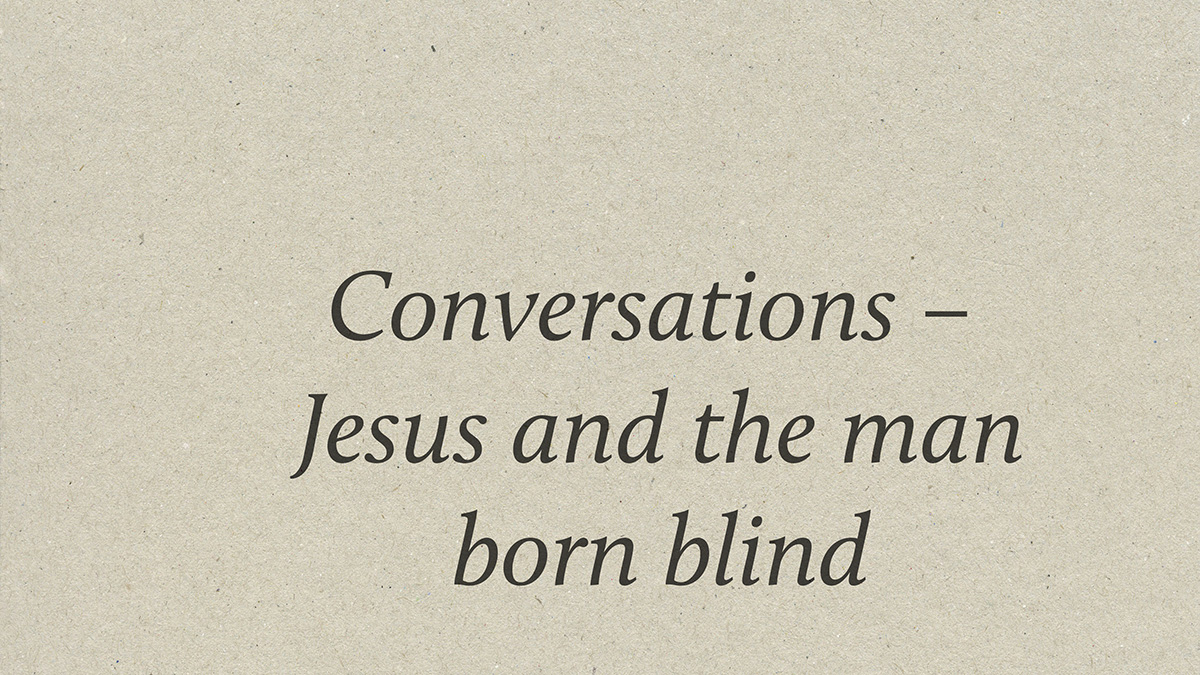Conversations: Jesus and … the man born blind (John 9)
Holy Spirit, we ask you for insight. Bring God’s Word alive to us, please – in Jesus’ name.
Imagine yourself in your local town. For a long time, there has been a person with a disability sitting outside but near the entrance to the local supermarket. The person has a container in front of them to receive donations, plus a note about their situation. The person may or may not be receiving any NDIS support; you don’t know. You are used to seeing this person sitting there. Perhaps they simply want to be near other people?
One day, as you are walking towards the supermarket entrance you actually take special note of this person sitting there again. Something within you nudges you to talk with the person.
Even though you might feel some discomfort in taking the initiative, what kind of thing would you say or ask?(discuss in twos or threes – 4 minutes?)
Ask for two (?) feedback responses.
Now take time to read John 9. There’s a lot that happens in this story, with many different participants. After you have read it or listened to it being read, take a few minutes to write a few notes here on what caught your attention and why. (4 minutes?)
Ask for two (?) feedback responses.
My NIV Study Bible footnotes say that Jesus performed more miracles of this kind than of any other. Giving sight to the blind was predicted as a Messianic activity (Isaiah 29:18; 35:5; 42:7), and as the Gospel of John 20:31 says, the things recorded of what Jesus said and did are that we might believe and by believing we may have life in his name.
Since Genesis 3, when our first parents believed the enemy’s lies and deception and thereby fell into sin, we see its repercussions everywhere. There’s trouble, trials, tribulations; there’s wars and rumours of wars, there’s death and dying, sorrow and suffering in many shapes and forms. But that’s not God’s last word on the situation.
Of what do these passages remind us:
Isaiah 61:1–3
Luke 4:14–21
A Closer Look
Please re-read John 9:1–12.
Why might the disciples have linked being born blind with sin? (vv1,2)
Does Jesus’ reply surprise you? (vv3–5) Why/why not?
If you were the blind person, what would you think about mud and saliva being put on your eyes?
There was no NDIS in those days. People had to fend for themselves, with support from family and friends. His neighbours and others had previously seen this man begging (v8). Why are people no longer sure if this is the same man that they had previously been aware of for years?
Please re-read John 9:13–18.
There’s no indication that the blind man had asked Jesus to heal him. I wonder why he was then taken to the Pharisees. Were they wanting to cause trouble for Jesus for healing the man’s eyes on the sabbath?
The Pharisees were a separatist and legalistic group who strictly kept the law of Moses and the unwritten tradition of the elders (Matthew 15:2). They were teachers in the synagogues, religious examples in the eyes of the people, and self-appointed guardians of the law and its proper observance. They considered the interpretations and regulations handed down by tradition to have almost the same authority as Scripture. According to Pharisaism, God’s grace extended only to those who kept his law. How would we fare with that measure?
Yet Jesus would often heal people on the Sabbath. As one commentator has written, Jesus had violated the rabbinical rules of the Sabbath, though his act had been in perfect harmony with the spirit and even the letter of the Mosaic Law. The making of clay with the saliva was an infringement of the rule, likewise, to apply saliva to the eyelid, because it would be the application of a remedy. Law or grace?
What is the nature of the “conversations” in these verses, and why are the people perplexed by what has happened? (discuss in twos or threes – 4 minutes?)
Ask for two (?) feedback responses.
Next the parents are put on the spot. We aren’t told if the blind man had been living with his parents or alone. They were not present when his healing happened. Having been born blind, he would have learned to get around by himself, feeling his way, including finding his way to the Pool of Siloam to wash. Can you imagine his reaction as he washed his face? Wow! He had not seen who had spoken to him. Yet the Jews don’t believe him and continue to grill him.
Please re-read John 9:18–34.
The parents of the healed man were afraid of the Jews, and their fear impacts their support of their son. A second time his inquisitors summon him with a solemn charge to tell the truth (see Joshua 7:19), and he grows bolder in his responses, even though it may mean they excommunicate him from the synagogue, his community – which they then did.
What gave him courage to speak as he did, and why?
Please re-read John 9:35–41.
Note the difference between Jesus seeking out the healed man to encourage him and that of the Jews looking to accuse and find fault. There’s a saying: “There’s none so blind as those who do not want to see”.
What does this “saying” mean to you?
How can we help each other “see” the deeper things in life Jesus speaks of?
Prayer: Lord, we ask for wisdom, courage, humility, patience, and the willingness to extend love in all our conversations because that is how you are. Amen.

